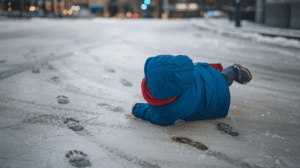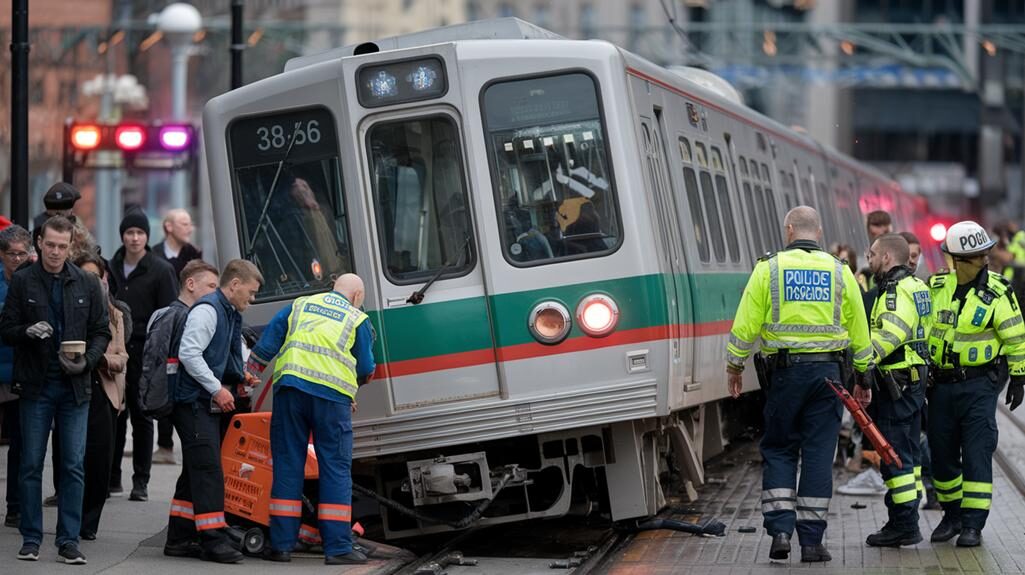In a slip and fall accident, liability typically falls on the property owner or occupier, who is responsible for maintaining a safe environment. This can include business owners, landlords, or even government entities that own public property.
If the property owner knew about a dangerous condition, such as a wet floor or broken step, and didn’t fix it or warn visitors, they likely will be liable for the injuries caused. In some cases, other parties, like maintenance companies, could also be responsible if their actions contributed to the hazard. A Boston slip and fall accident lawyer will review your case.
Possible At-Fault Parties for a Slip and Fall Accident
Multiple parties could be at fault for your slip and fall injury. Correctly identifying the responsible person in your case is unlikely without professional legal support. A personal injury lawyer will examine the unique details of your incident and create a personalized legal strategy to recover your losses.
Property Owner
A property owner can be liable for a slip and fall accident if they fail to maintain a safe environment for visitors. This includes not fixing hazardous conditions like wet floors, uneven sidewalks, broken steps, or poor lighting.
If the property owner knew about a danger or should have known about it but didn’t take steps to fix it, they likely will be held responsible for any injuries that occur as a result. Property owners have a legal duty to keep their premises safe for tenants, customers, and other visitors.
Business Owner
A customer walks into a café on a rainy day and slips on a puddle of water near the entrance. The café owner knew the water was leaking from the door but didn’t clean it up or put up a “wet floor” sign. The owner also didn’t use mats or any other way to manage the rainwater. The customer falls and injures their leg.
In this case, the café owner could be held liable because they knew about the hazard but didn’t take steps to fix it or keep customers safe. The owner is responsible for maintaining a safe environment, and failing to address the water hazard could make them liable for the injury.
If you were injured in a slip and fall while shopping at a store like Wal-Mart, you have the option to pursue compensation. A slip and fall accident attorney will compassionately guide you through the legal process.
Maintenance or Cleaning Company
For example, if a cleaning company mops a floor and leaves it wet without putting up warning signs, and someone slips and gets injured, the cleaning company could be held responsible. Their job is to ensure the area is safe after cleaning, and failing to do so will likely make them liable for any accidents that occur as a result.
Similarly, if a maintenance company neglects to fix a dangerous condition, like a broken step or loose railing, it could be held accountable if someone is injured because of it.
Tenant
If a tenant rents an apartment and neglects to clean up a spilled drink on the floor, and a guest later slips on the wet area and gets hurt, the tenant could be held liable. In this case, the tenant’s failure to clean up the spill and make the area safe could make them responsible for the injury.
Government Entity
A government entity can be responsible for a slip and fall if the accident happens on public property, such as sidewalks, parks, or government buildings, and the entity was negligent in maintaining that property.
For example, if a person slips on a poorly maintained sidewalk with cracks that the local government knew about but didn’t repair, the government could be held liable. However, filing a claim against a government entity often involves different rules and procedures, such as shorter time limits for filing a lawsuit.
How to Prove the At-Fault Party’s Liability
Liability means being legally responsible for an accident and any injuries that result from it. To prove liability in a slip and fall case, you must show that the at-fault party was negligent. Negligence happens when someone fails to take reasonable steps to prevent harm.
To establish the at-fault party’s negligence, your slip and fall accident attorney will examine the following key aspects:
- Duty of care: The at-fault party had a legal responsibility to keep the property safe. For example, business owners, property managers, or landlords have a duty to maintain their property and protect visitors from hazards.
- Breach of duty: Once the duty of care is established, your lawyer will look for evidence that the defendant failed to meet that duty. This could involve actions like ignoring a known hazard, not maintaining the property properly, or failing to warn others about dangers (like wet floors or uneven pavement).
- Causation: Your attorney will show that the dangerous condition, such as a wet floor or uneven sidewalk, led directly to the fall. They will gather evidence, like witness statements and accident reports, to connect the breach of duty to your injuries.
- Losses: Finally, your lawyer will assess the losses you have suffered because of the accident. This includes medical bills, lost wages, pain and suffering, and other related expenses.
A Personal Injury Lawyer Will Determine Who Is Liable for a Slip and Fall Accident
Since 2004, Jason Stone Injury Lawyers has been helping injured individuals recover and move forward after an accident. If you’ve been hurt, contact us today for a free consultation to discuss your case and learn about your options.
We work on a contingency fee basis, meaning you don’t pay anything unless we win your case. Our fees come from a portion of the settlement or compensation we secure for you, so there are no upfront charges or out-of-pocket expenses. This is all part of our Stone Cold Guarantee®, designed to give you peace of mind while we fight for maximum compensation.
Not Trusting What You’re Being Told?
Better Phone Stone
800-577-5188
 START MY NO OBLIGATION CONSULTATION
START MY NO OBLIGATION CONSULTATION








